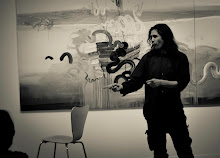Beyond my personal reasons for performing philosophy, there are a number of substantive reasons why it works so well. Firstly a large and very important part of the philosophical canon was, and in a sense still is, essentially oral. Before printing, ideas which resonated, which worked, had to be those which not only passed from book to book, but also lingered in the memory. Think of Plato's style, of the fact that we have Aristotle's lectures notes, or the lecture stylistics of Plotinus. Philosophy was then always, like so much of ancient culture, a game of speaking, thinking and remembering, and doing it is as stand up or performance is merely recalling that fact.
But there is a second very deep reason why Philosophy works as 'stand up', which goes close to the heart of my understanding of the discipline. It has always seemed to be, that most truly great philosophical ideas are actually rather simple in essence. They might mangle the mind, and make you re-think how you understand what you are, but the idea itself is very simple, and often quite succinct. It can therefore be taken succinctly from the context of a book, and presented as a thing in itself, as an idea that people will encounter, to surprise and delight.
But there are other reasons why Philosophy works as performance, great philosophers are, as Deleuze said, great stylists. They are re-working language, forging a word hoard of their own, and you can actually hear them do it as you perform them. Whether it is in the form of the great opener, or ending, or slips in words or quiet and complex or even evolving repetitions, all make their presence felt, and add to the performance. In a sense this is only natural, one is after all performing some of the finest material ever written.
Finally, albeit in a subtle way, great philosophy is great drama or perhaps comedy. Philosophy is after all, quite literally mind changing, and what is more dramatic than that? Moreover great works of philosophy often represent moments in a crisis, be that its onslaught or its resolution. They are therefore in a sense naturally dramatic, a drama that establishes odd connections between some of the deep assumptions of our own mind, and the personal histories and individual crises, of the thinkers, whose ideas laid down those assumptions. What we take as natural and so obvious, is seen differently, as an idea that is new and heartfelt, or perhaps agonising, or beautiful, or even ridiculous. Stand up philosophy opens us up to a drama we are still part of, and throws light on our place in it, as both audience but also as modern actors.
Or to put it another way, Philosophy is essentially dramatic - and stand up philosophy merely surfs that fact.


No comments:
Post a Comment